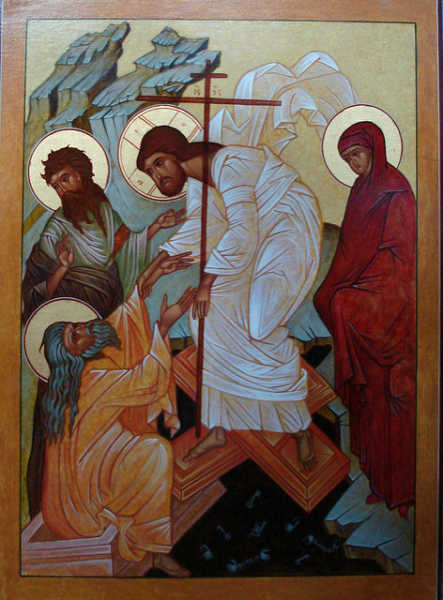We run our website the way we wished the whole internet worked: we provide high quality original content with no ads. We are funded solely by your direct support. Please consider supporting this project.

The God Who Stoops
The way that one imagines God can be thought of along the lines of a Rorschach test. That is, I submit that the way a person imagines and experiences God says at least as much about that person as it does God. The more estranged people are from God, the more their knowledge of him is obstructed and distorted. And when people yield to the Spirit, they are empowered to discern the true glory of God “in the face of Jesus Christ.”
That being said, the standard that must function as the ultimate criteria by which we assess the extent to which any conception and experience of God is accurate or inaccurate is the revelation of God in the crucified Christ.
Hence, on the one hand, to the extent that any conception and experience of God conforms to the character of God revealed on the cross, we may conclude that the Spirit has managed to break through the limited and fallen hearts and minds of people. On the other hand, to the extent that any conception or experience fails to conform to this character, we must conclude that the limited and fallen hearts and minds of people have resisted the Spirit.
Given Scripture’s repeated teaching that the people God claimed for himself in the OT were a “stiff-necked” people who continually resisted the Spirit, we ought not be surprised to discover that their conceptions and experiences of God were sometimes distorted. To the contrary, I believe we ought to rather be impressed by how frequently the Spirit succeeded in breaking through to disclose beautiful portraits of God that reflect his true character.
Knowing what we now know about God through his self-revelation on Calvary, we ought to be able to discern the true character of God in the depths of even the most seriously distorted portraits of God in the OT. For when we view them through the lens of the cross, we can see that there is something going on beneath the surface. We can discern in their depth the same humble God of self-sacrificial love stooping to bear the sin of his people that we discern on the cross.
In the OT, we can see God working within his people’s faulty Rorschach-like conceptions and experiences of him. God was bearing the sinful perspectives of his covenant people, including the horrifically violent concepts they had of him. He was accommodating the hard-heartedness of his people, stooping to their level to move his people in the right direction. The fact that God was willing to stoop in this fashion and bear the sin of his people reveals God’s true character, anticipating the revelation of God ultimately revealed on the cross.
Photo credit: jimforest via Visualhunt.com / CC BY-NC-ND
Category: General
Tags: Bible Interpretation, Cruciform Theology
Topics: Interpreting Violent Pictures and Troubling Behaviors
Related Reading

Where Psychology and Theology Meet
Guest post by Ty Gibson The biblical narrative reveals that God bears our guilt—not merely in the penal sense that Reformed theology asserts—but in the sense that He bears our misconceptions of His character as we project our sins upon Him. To the degree that fallen human beings find it psychologically impossible to bear the…

Atonement: What is the Christus Victor View?
Most western Christians today understand the atonement as a sort of legal-transaction that took place between the Father and the Son that got humanity “off the hook.” The legal-transaction scenario goes something like this: God’s holiness demands that all sin be punished, which in turn requires that sinners go to eternal hell. The trouble is,…

What To Do With the Violent God of the Old Testament
For eight years Greg has been researching for and writing the book entitled The Crucifixion of the Warrior God. In it he confronts the commonly held idea that the Old Testament depictions of God behaving violently should be held alongside of and equal to the God revealed through Jesus dying on the cross. But if the Old Testament…

Podcast: Must We Believe in the Historicity of the OT Stories to Trust in the Bible and in Jesus?
Things get deep, literarily, as Greg discusses deep literalism. http://traffic.libsyn.com/askgregboyd/Episode_0384.mp3

How the Church is Tempted to “Do Good”
The previous post spoke of God’s call to the church to be resident aliens: a holy, distinct people who are set apart and peculiar when compared to the patterns of the world. The holiness of God’s kingdom is cruciform love, which constitutes our distinct witness to the world. Preserving this holiness and resisting the Devil’s…

God’s Kind of Warfare
Over and over, and in a variety of different ways, we are told that, while “[s]ome trust in chariots and some in horses,” Israelites were to “trust in the name of the LORD our God” (Ps 20:7), for “[n]o king is saved by the size of his army” and “no warrior escapes by his great…
